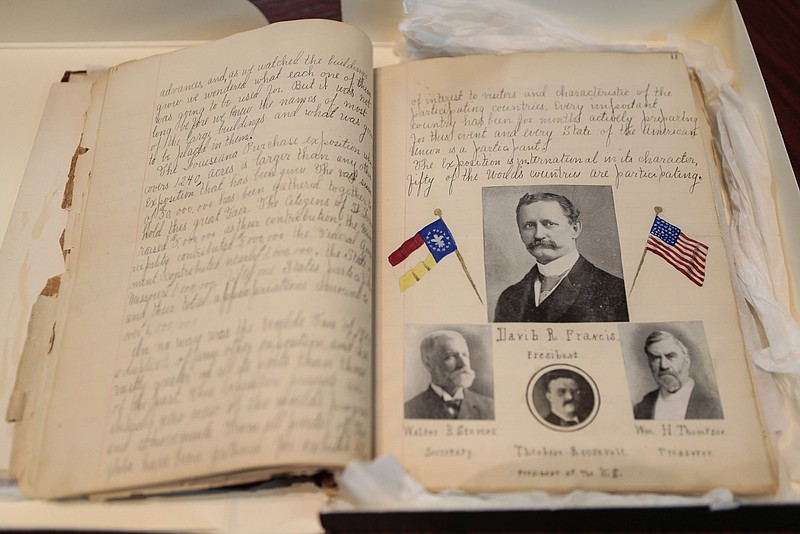ST. LOUIS - Stephen Phelps calls it the "family bible," the "holy grail" that has survived 116 years and three generations of family members. But now the family bible, a 132-page diary of the 1904 World's Fair written by Phelps' grandmother, Adele Quinette, has found a new home.
Last month, the Phelps family parted ways with the keepsake journal and donated it to the Missouri Historical Society.
The process first started in July, when Phelps reached out to the archivist Molly Kodner. After speaking with Phelps and hearing about the contents, Kodner didn't even need to read through the whole diary to know she wanted it.
"On a regular basis, we're offered tickets, invitations, souvenirs, stockholders tickets and sometimes it has a photograph of the person whose ticket it is," Kodner said. "Those things are important too, but a diary, and especially a diary like this, that has photographs and souvenirs and postcards - it's just very rare."
It marks the society's first World's Fair-related diary donation in 24 years.
"Diaries are crucial for us to collect - and just diaries of everyday people talking about everyday things - because it provides social and cultural history and the daily life of people over time that you can't really get from anything else," Kodner said.
But it isn't just the diary form that attracted the Missouri Historical Society - it is how the diary is written. Adele Quinette was just 16 years old when she composed this book-length, ethnographic-like deep-dive into the World's Fair. Family members speculate Quinette first started the project for school.
"She did this just so deliberately and so detailed," Phelps said. "She went through with this exhaustive review of each and every area, their contents and the buildings. The only time is in the last 10 pages, she gets to the fun part she's finally writing like a 16-year-old girl. Up until then, you think this is some author who's trying to write a book on the subject. And that's very cool. It's fascinating."
In neat, cursive handwriting, Quinette reported on a large number of the 62 different nations represented at the fair - from the French, her ancestry, to the Brazilian to the Filipino. She illustrated the famous waterfall running down Art Hill, Cascades, with her writing. She even featured countless artifacts from her near 85-day exploration of the event, including postcards, personalized invitations, maps of the fair and the iconic block-lettered autograph of Apache leader Geronimo.
When Phelps grew up, he remembers a "lore" surrounding the diary. Quinette, whom Phelps calls "loquacious," would reference the diary and share memories from the fair. But until Quinette passed away at age 99 in 1987, the diary sat hidden in a box under her bed. Phelps never saw it.
"She was necessarily the living diary," Phelps said.
After Quinette died, it spent about 20 years in the hands of Phelps' father and stepmother. Phelps received the diary in 2008, and when he finally did read through it, he noticed why it needed to be preserved.
After speaking with a conservator, Phelps put acid-free paper in between the pages and placed it in a safe deposit box. He made copies of the book to give to family members, so he could limit the use of the fragile pages. For about five years, the book sat untouched before he decided it needed a change of scenery.
This year, Phelps turned 79. It's not that he hears "the mortality bells ringing," he said, but after consulting with his family members (five of which attended the donation ceremony), he realized it was time to let go of the diary, where it could be more than just the Phelps' "family bible."
"Keeping it in a safe deposit box does no good for anyone," he said.
The Missouri Historical Society will now house the diary in their own form of a safe deposit box - humidity and climate-controlled stacks. But it won't stay there for long. Visitors will be able to flip through Quinette's diary in-person and, within the next year, access it digitally as well. The World's Fair serves as one of the Missouri Historical Society's most popular research topics, making it destined for public attention.
"It has been a long time," Kodner said, "since we got something this exciting."

